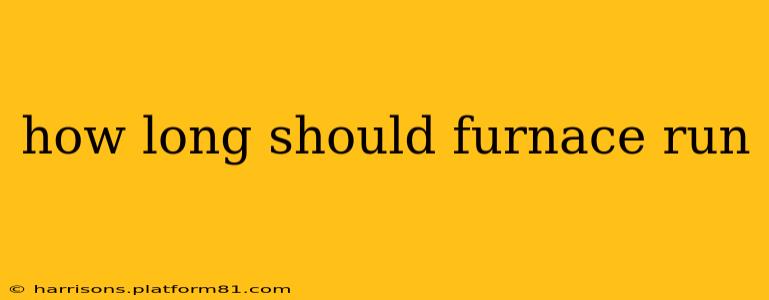How Long Should Your Furnace Run? A Comprehensive Guide
Determining how long your furnace should run is a complex question, as there's no one-size-fits-all answer. The ideal runtime depends on several factors, including your home's size, insulation, climate, and the furnace's efficiency. However, understanding the key indicators and potential problems will help you optimize your system's performance and energy efficiency.
Understanding Normal Furnace Operation:
A modern, well-maintained furnace shouldn't run continuously. Instead, it cycles on and off, maintaining a consistent temperature. Each cycle typically consists of a heating period followed by a "rest" period where the blower continues to circulate air, or shuts off completely depending on the system type. Short cycles (a few minutes on, a few minutes off) usually point to an efficient system effectively managing your home's temperature. Longer, sustained runs could signal a problem.
Factors Affecting Furnace Runtime:
Several factors influence how long your furnace operates:
-
Outside Temperature: Colder temperatures naturally necessitate longer run times. Expect longer cycles during extreme cold snaps and shorter ones during milder weather.
-
Home Insulation: A well-insulated home retains heat more effectively, reducing the furnace's workload and runtime. Poor insulation leads to more frequent and longer heating cycles.
-
Home Size: Larger homes require more energy to heat, resulting in longer furnace run times.
-
Furnace Efficiency: Newer, high-efficiency furnaces generally operate more efficiently, requiring less time to heat your home. Older systems might run longer to achieve the same result.
-
Thermostat Settings: Setting your thermostat to a higher temperature will obviously make the furnace run longer. Lowering the temperature, even by a few degrees, can significantly reduce runtime and energy bills.
-
Number of Occupants: More people in the house will generate more body heat, which can slightly reduce the furnace's workload.
-
Air Leaks: Significant air leaks around windows, doors, and other areas cause heat loss, increasing the furnace's runtime.
How Long is Too Long?
While there's no definitive timeframe, if your furnace seems to be running consistently for extended periods (30 minutes or more without a break), it's a sign that something might be wrong. This prolonged runtime could indicate:
-
Low Air Filter: A clogged air filter restricts airflow, forcing the furnace to work harder and run longer.
-
Frozen Condenser Coil (Heat Pumps): If you have a heat pump, a frozen condenser coil can severely impede its ability to transfer heat.
-
Dirty Burners/Heat Exchanger: Buildup on these components reduces efficiency, necessitating longer run times.
-
Malfunctioning Blower Motor: A weak or faulty blower motor may not circulate air effectively, extending the heating cycle.
What if my furnace runs only for a short time and then shuts off?
Short cycles, particularly if they're frequent, might be an indicator that your furnace is struggling to meet the thermostat's demand, potentially due to:
- Improper Thermostat Calibration: The thermostat may be set incorrectly or malfunctioning.
- Low Refrigerant (Heat Pumps): Heat pumps need sufficient refrigerant to operate correctly.
- Faulty Thermostat: A faulty thermostat can cause erratic cycling.
How to optimize your furnace runtime:
-
Regular Maintenance: Annual professional maintenance is crucial to ensure your furnace operates efficiently and safely.
-
Replace Air Filters Regularly: Check and change your air filter every 1-3 months, or as needed, based on your system and household.
-
Improve Home Insulation: Seal air leaks and consider adding insulation to walls, attics, and floors.
-
Adjust Thermostat Settings: Lowering the temperature, even by a few degrees, can significantly reduce energy consumption and runtime. Consider a programmable or smart thermostat for optimal control.
In conclusion, the ideal furnace runtime varies depending on numerous factors. However, paying close attention to your furnace's behavior and addressing any issues promptly can help ensure optimal performance, energy efficiency, and a comfortable home environment. If you're concerned about your furnace's runtime, contacting a qualified HVAC technician is recommended for diagnosis and maintenance.
